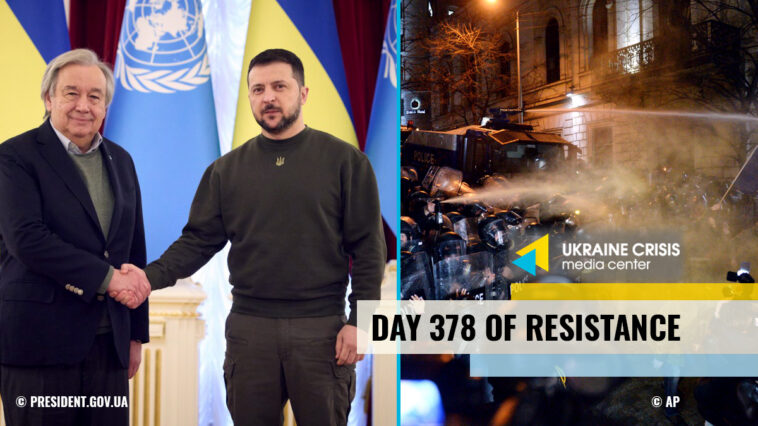U.N. Secretary-General visits Kyiv
On Wednesday, March 8, United Nations Secretary-General Antonio Guterres was in Kyiv. On his third visit to Ukraine since the invasion, Guterres met with Ukrainian President Volodymyr Zelenskyi for talks on extending the grain export deal.
The U.N. Secretary-General was in Ukraine on August 17-19. He met with Ukrainian President Zelenskyi and Turkish President Erdogan in Lviv, and visited the port of Odesa, authorized to export grain. On April 28, when he first visited Ukraine, Russia carried out a missile strike that hit an apartment building in Kyiv, killing Ukrainian journalist Vira Hyrych.
Guterres said the U.N.’s ultimate goal is to secure a just peace based on the U.N. Charter and international law.
“The position of the United Nations, which I have consistently expressed, is crystal clear: Russia’s invasion of Ukraine is a violation of the U.N. Charter and international law. The sovereignty, independence, unity and territorial integrity of Ukraine must be upheld, within its internationally recognized borders. Our ultimate objective is equally clear: a just peace based on the U.N. Charter, international law and the recent General Assembly resolution marking one year since the start of the war,” the U.N. Secretary-General told a news conference.
Guterres said that until a just peace can be secured in Ukraine, the U.N. would continue working hard to ease the suffering for the Ukrainian people and mitigate global implications of war.
He expressed solidarity with all victims of war — those who had lost their loved ones or had to flee the Russian onslaught.
Ukraine’s chief commander avoids Russia’s trap in Bakhmut, the Economist says
A Russian offensive on Bakhmut that began in late January was intended, in part, to force Ukraine to commit the reserves, thereby making it much harder to mount a counter-offensive. But the battle for the town has resulted in far greater Russian losses than Ukrainian ones. And more importantly (Commander-in-Chief of the Ukrainian Armed Forces) General Zaluzhnyi has avoided the obvious trap, an article by the Economist says.
Instead of throwing sizeable reserves into Bakhmut to save the town, which is of far greater symbolic than military value, he has sent troops abroad to train on the new equipment.
General Valery Zaluzhnyi, Ukraine’s top officer, hopes that he will eventually have three new army corps at his disposal, each with six brigades, and each comprising more than 20,000 men, the Economist says.
Anti-government protests erupt in Georgia
Massive protests erupted in Georgia after the country’s parliament passed the first reading of a controversial draft law on “foreign agents” on March 7. The bill follows the model of a law in Russia, used as a means to censor media and crack down on civil society.
The draft law “On Transparency of Foreign Influence” would require non-governmental organizations and media receiving more than 20 per cent of their funding from overseas to register as “foreign agents” or face fines. The bill mirrors a Russian law.
The bill was introduced to parliament by the People’s Power faction that formed after Russia’s full-scale invasion of Ukraine. Its members call Georgian NGOs “U.S. agents” and promote narratives of the Russian propaganda. The movement describes its goals as opposing “the propaganda of liberal ideology” and “the West’s will to drag Georgia into war”.
The draft law gained support from the ruling Georgian Dream party that together with the People’s Power has majority control in the parliament.
On the evening of March 7, thousands of people gathered on Rustaveli Avenue and outside the parliament in Tbilisi to protest against the draconian draft law. The protesters were holding Georgian and EU flags. Some placards expressed solidarity with Ukraine and objected Russia’s growing grip on Georgia.
The rally in central Tbilisi deteriorated into clashes with police. Police used beatings with batons, rubber bullets, and water cannons against protesters. The crowd responded with petrol bombs.
The President of Georgia, Salome Zourabichvili, threw her support behind protesters. In a video address on March 7, she said she would veto the law if it crossed her desk. She also criticized the bill. “I stand next to you because you are the very people who represent free Georgia today. The Georgia which sees its future in Europe and will not let anyone take this future away from it,” Zourabichvili said. “This future belongs to next generations and all of us. This is the future that past generations were preparing for and that we are preparing for right now,” she said. Yet the parliamentary majority may overcome the president’s veto.
Anticipated effects of EU oil embargo on russian market. Ukraine in Flames #363
The European Union has introduced a ban on imports of russian oil and oil products and agreed on a price cap for petroleum products, stepping up its economic fight against the Kremlin. The idea is to hurt the oil industry, whose massive profits are being used by russia to bankroll its war in Ukraine. Watch Ukraine in flames #363 to find out will it really hurt russian war machine and what would be the consequences for russian oil market and economy.
Guests:
- Mykhailo Gonchar, Energy Expert, President of the Centre for Global Studies Strategy XXI
- Serhiy Kuiun, Director of A95 Consulting Group




